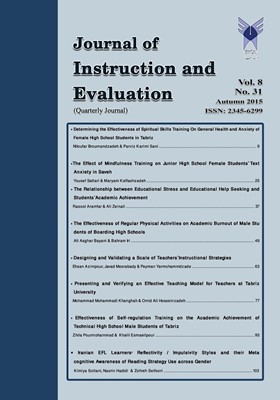Presenting and Verifying an Effective Teaching Model for Teachers at Tabriz University
Subject Areas : Educational PsychologyMohammad Mohammadi Khangah 1 , Omid Ali Hosseinzadeh 2 *
1 - دانش آموخته کارشناسی ارشد تحقیقات آموزشی، واحد شبستر، دانشگاه آزاد اسلامی، شبستر، ایران
2 - استادیارگروه علومتربیتی، واحد شبستر، دانشگاه آزاد اسلامی، شبستر، ایران
Keywords: teaching, effective teaching model,
Abstract :
The main purpose of this research was to present and verify an effective teaching method for faculty members at Tabriz University. This research was a descriptive survey. The statistical population of this research contains two parts. The first part includes Tabriz university factory members (N=541) and the second part includes educational sciences specialists from different universities of Tabriz (N=32) (Tabriz university, Islamic Azad university and Payame Noor university). Krejcie and Morgan table was used to choose 225 sample for the first part through random classification sampling method. In this research, a (researcher made) questionnaire with 36 items and 5 choices in Likert Scale was used. The validity of the questionnaire was investigated on the basis of credible scientific resources by 3 experts; its reliability was examined through a pilot study among 30 people, using Cronbach's Coefficient Alpha which was found to be 0.93. Then, the questionnaires were distributed among the participants. The data was investigated using SPSS19 and LISREL softwares`. A T-Test was used to identify the components of effective teaching model, factor analysis was used for the proposed model, and finally descriptive statistics was used to test the validity of the model. The findings show that the proposed effective teaching model contains four effective parameters of professional teaching skills: ability to communicate with students, mastery of materials and contents, and evaluation that compose %77 of the total variance of effective teaching. From specialists` point of view, the credibility of the proposed effective teaching model is 83.6. out of 100.
منابع
اچسون،کیت وگال،مردیت دانین (1380). نظارت و راهنمایی تعلیماتی، ترجمه محمدرضا بهرنگی، کمال تربیت، تهران.
بنیداوودی، شهره (1393). مقایسه ویژگیهای تدریس اثربخش از دیدگاه دانشجویان علوم پزشکی جندی شاپور اهواز، فصلنامه آموزش پزشکی، مرکز مطالعات و توسعه آموزش علوم پزشکی، دانشگاه علوم پژشکی بابل، دوره دوم، شماره 2 ، صص 13-7.
بهنامفر، رضا (1392). فن بیان در تدریس؛ عنصر فراموش شده، مجله ایرانی آموزش در علوم پزشکی، صص625-623.
خندقی، امین و سیفی، غلامعلی (1392). توانمندیها و مهارتهای مؤثر و مورد نیاز برای تدریس در دانشگاه، فصلنامه پژوهش و برنامهریزی در آموزش عالی، شماره 69 ، صص 147-121 .
صالحی، شایسته (1380). تدریس اثربخش. مجله دانشگاه علوم پزشکی شهر کرد، دوره سوم، شماره 2 ،صص21-12
طالبزاده شوشتری، لیلا و پورشافعی، هادی (1390). اسنادهای استادان موفق در خصوص روشهای ارتقای انگیزه تحصیلی دانشجویان دانشگاه بیرجند، فصلنامه پژوهش و برنامهریزی در آموزش عالی، شماره 60، صص 98-91 .
ظهور، علیرضا و اسلامی نژاد، طاهره (1381). شاخصهای تدریس اثربخش از دیدگاه دانشجویان دانشگاه علوم پزشکی کرمان، فصلنامه پایش، سال اول، شماره 4 ، صص 13-5 .
عندلیب، بهاره و احمدی، غلامرضا (1386). میزان به کارگیری معیارهای تدریس اثربخش در دانشگاه آزاد اسلامی واحد خوراسگان از نظر دانشجویان در سال تحصیلی 1386-1385، دانش و پژوهش علوم تربیتی، دانشگاه آزاد اسلامی واحد خوراسگان، شماره پانزدهم ، صص 82-67 .
محجوب مؤدب، هاجر و عسگری، فریبا (1389). مقایسه ویژگیهای تدریس اثربخش از دیدگاه مدرسین و دانشجویان دانشگاه علوم پزشکی گیلان، مجله مرکز مطالعات و توسعه آموزش پزشکی، دوره هفتم، شماره اول،ص33-26 .
محمدی، محمد (1394). ارائه مدل برای تدریس اثربخش در دانشگاه تبریز. پایاننامه کارشناسیارشد، رشته تحقیقات آموزشی، دانشکده علوم انسانی دانشگاه آزاد اسلامی واحد شبستر، مرداد 94 .
ملکوتی، محمد (1388). تدریس در گروههای کوچک(بحث گروهی)، فصلنامه راهبردی آموزش، 6،ص183 .
میرمحمدی میبدی و همکاران(1391). بررسی ویژگی های تدریس اثربخش از دیدگاه دانشجویان دانشگاه علوم پزشکی شهید صدوقی یزد، مجله توسعه آموزش در علوم پزشکی، دوره 5 ، شماره9 ،صص 62-52.
Jason, P. N. (2010). Public universities Administrator and Technology Policy Making. Educational. Administration Quarterly, 39(4), 34-36.
Lui, S. & Meng, L., (2009). Perceptions of teachers, students and parents of the characteristics of good teachers: A cross-cultural comparison of china and the United States. Educational, Assessment, Evaluation and Accountability, 21. 313-328
Michael, W, Kurygn a VPL Vmarshal Chapman (2008). Trust in teacher. A motivating element.
Petrovici, M., A., (2012). Effective methods of learning and teaching: a sensory approach, 3rd World conference on learning, teaching and educational leadership, 93, 146–150
Polk, J. A. (2006). Traits of effective teachers. Arts Education policy Review, 107 (4): 23-29.
Quinn M. F., (2000). The principles and practice of Nurse Education, Chapman & Hall, London.
Scheeler, M. C. (2008). Generalizing Effective teaching skills: The missing link in teacher Preparation. Journal Behavioral Education, 17(2), 145-159.
Simerjit, s., Dinker, R. P., Nirmal, K., S., Avneet, K., Htoo Htoo K., S., & Ankur, B., Qualities of an effective teacher: What do medical teachers think? Singh et al. BMC Medical Education, 2013: 13(128), 2-7.
Wan, N., Howard, N., & Alan, W. (2010). School experience influences on pre-service teachers evolving beliefs about effective teaching. Teaching and teacher Education, 26, 278-289.

